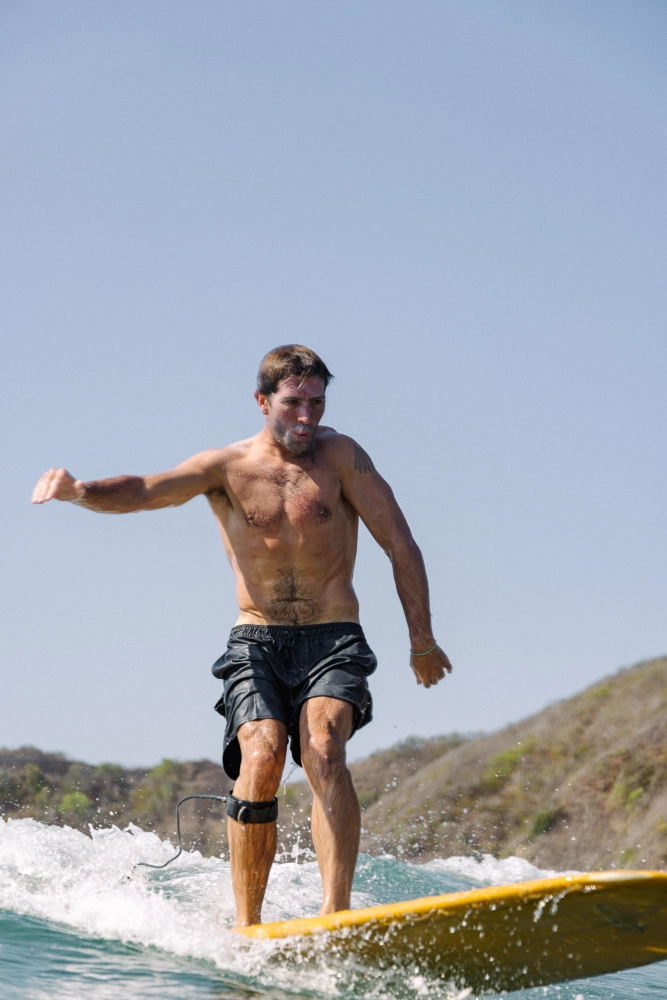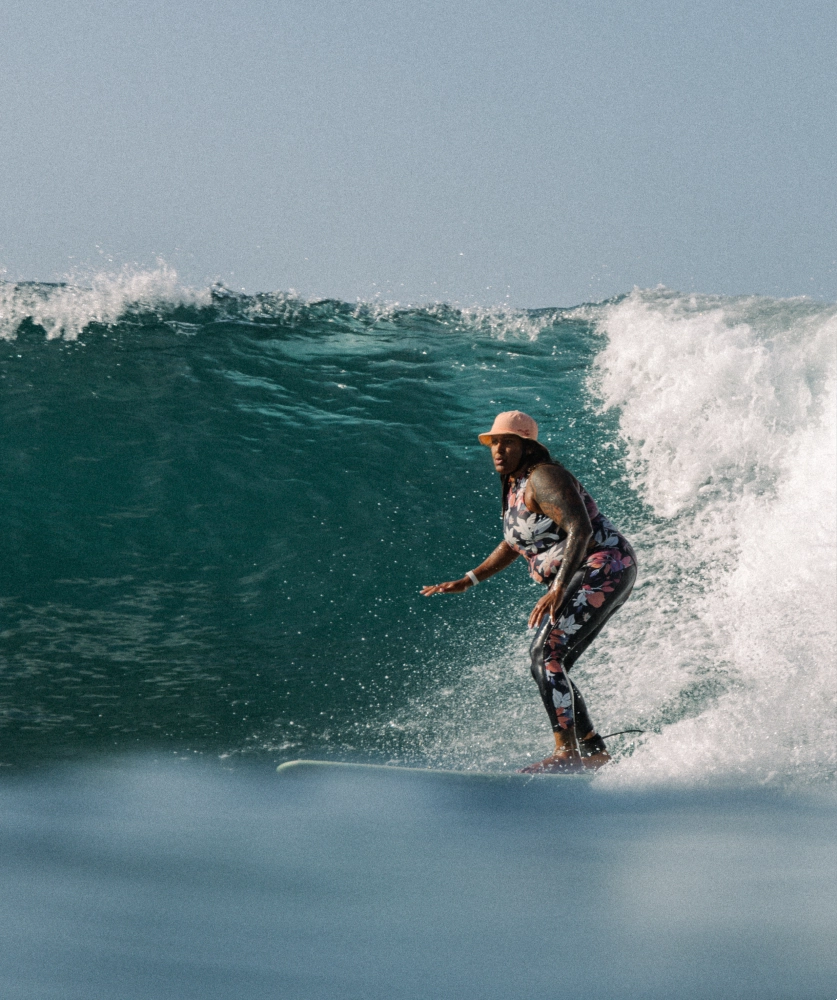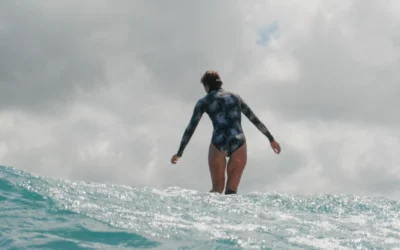In Part 2 of our chat with surfer and therapist Danni, we move from insight to action.
This time we’re diving into practical tools, mindset shifts and emotional strategies to help you move through fear, build real confidence in the water and reconnect with the joy of surfing on your terms.
Check it out below or read Part 1 if you haven’t already – it’s good stuff!


Q. We understand that everyone is different, but are there practical ways to reset and reframe a “bad” session or experience so it doesn’t negatively impact the next one?
Of course, I cover many more tools and techniques in my workshops and one-on-one sessions, but here are a few simple takeaways that anyone can start practicing right away.
So, let’s say the fear has kicked in.
You might be feeling triggered by a past incident, and your mind starts to spiral… what now?
- Step one is grounding yourself.
Using present-moment awareness can help break the spiral and bring you back into your body.
Take a few deep breaths and gently bring your awareness inward. Notice what you can see, hear, smell or feel around you. Tune into whatever sense feels most accessible and focus on something specific.
Take another deep breath and stay with that present experience.
This isn’t always easy, especially if you’re new to it, so be kind and patient with yourself as you practice.
- Positive self-talk
Challenge that inner critic with a more compassionate voice.
Ask yourself: What would a kind friend say to me right now? Then say those words to yourself.
Replace any negative thoughts with opposing, encouraging statements.
- Celebrate your wins
Make a habit of celebrating the small victories.
If your pop-up feels off, notice if self-criticism creeps in and instead smile and congratulate yourself for committing and going for the wave.
Actively shift your narrative from spiraling to self-celebrating.
- Use mantras
Have a few supportive mantras ready to go.
Short, punchy phrases like “You got this” can be incredibly grounding and energising.
I personally use this one a lot when I’m psyching myself up for a bigger wave.
- Reflect with balance
After your session, especially if it feels like a bad one, allow yourself to feel the frustration.
Then, consciously bring to mind 3–5 good things that happened. These don’t need to be about riding waves. Maybe it was the light on the water or a laugh with a friend.
This creates emotional balance and can prevent you from carrying a negative mindset into your next session.
Q. These are so good! Do you have a memorable success story whereby a client has used these strategies to overcome fear or mental blocks?
For sure! One example really highlights how important our relationship to fear is.
I once worked with someone who had experienced trauma in the ocean and, as a result, had developed a deep fear of the water along with a strong sense of shame around that fear.
They felt they had to hide it, especially from surf coaches, which only amplified their panic in the water.
Not only were they being triggered by past experiences, but they were also anxious and ashamed that someone might see them struggling. As you can imagine, this created a lot of distress.
This is where I leaned into my therapeutic training.
We gently explored the root of the fear, gave it space to be seen and validated and started working with it instead of against it. Through a lens of curiosity and kindness, they began to shift their relationship to fear… no longer seeing it as something to fight or suppress.
After some time doing this work, they shared that they’d had one of the best surf sessions of their life.
Their mindset had completely shifted, and that internal space they’d reclaimed allowed the whole experience to feel lighter, freer and much more enjoyable.
Q. That’s amazing. Well done to them and you. What about when it comes to lineups around the world? There’s often a power dynamic at play—locals, experienced surfers and those who are still finding their place. How do people manage this dynamic constructively?
The idea of shrinking in the surf is something I work with a lot (for obvious reasons), and I’ve noticed it often ties in with people-pleasing tendencies, which can absolutely show up in the water.
Common signs of this can include: pulling back from a wave when someone else is paddling for it (even if you’re closest to the peak and it’s rightfully yours), constantly feeling like you’re in the way (even when you’re not), over-apologising or thinking you’ve done something wrong.
Of course, there’s also the classic imposter syndrome, which is something that comes up all the time with surfers I work with.
These patterns can really hold you back from progressing. Here are a few supportive steps you can take.
- Awareness
Start simply by noticing these behaviours when they show up without judgment. Just observe.
- Acceptance
Remind yourself it’s impossible to please everyone and not everyone has to like you.
What matters most is living in alignment with your own values, rather than compromising or shrinking yourself to keep others comfortable.
- Assertiveness
If you’re closest to the peak, it’s your wave.
Commit to paddling for it—even if someone else is nearby. Most of the time, they’ll pull back if you show confidence. Not going at all because someone else is there can really stunt your progress.
Assertiveness doesn’t mean being aggressive. It’s about finding a healthy balance. You can be assertive and still smile!
- Communication
Don’t be afraid to use your voice in the lineup.
If you’re on an A-frame peak and someone’s going the opposite direction, you can split the peak… just check in with them quickly.
A little communication goes a long way. Sharing is caring!
When it comes to overconfidence, it’s a slightly trickier dynamic, but equally worth exploring.
- Self-awareness
Tune into your behaviour and how it might be impacting others.
If you find yourself dominating the lineup or feeling the urge to catch every wave (maybe even dropping in), take a moment to pause and reflect: where is this urge coming from?
It might stem from a more competitive or aggressive home break, where that kind of energy is the norm. But not all spots are the same.
Take a moment to read the atmosphere. If it’s a more relaxed, friendly lineup, it likely requires a softer approach.
- Connection
Making eye contact, smiling or chatting with someone in the lineup not only makes your surf more enjoyable—it also helps create a more welcoming and inclusive vibe for everyone.
At the end of the day, if we can show respect to everyone in the water, regardless of level, we help foster a more connected, compassionate surf community.
We all share this beautiful passion, and the ocean is a sacred space. Let’s honour her (and each other) by being kind, respectful and inclusive in the lineup!
Q. Danni, you’re an absolute GURU! Thanks so much for chatting with us. What’s the best way to contact you for surf confidence tips and coaching?
Thanks! And absolutely. You can find me on Instagram or via my website. You can also send me an email at [email protected].
For more tools for the body and mind, check Surf Girl Tribe. It’s a platform promoting positive mental health in surfing run by the wonderful Lexi Dells and myself!




